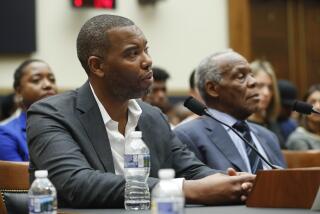Judge reconsiders key point in report that accused Israel of war crimes
- Share via
Reporting from Jerusalem — The head of a U.N. commission that accused Israel of committing war crimes during its military assault on the Gaza Strip two years ago expressed doubts Saturday about one of the inquiry’s central allegations: that Israel deliberately killed civilians.
Judge Richard Goldstone said new evidence provided by Israel’s military indicated that “civilians were not intentionally targeted as a matter of policy.”
In an essay published in Saturday’s Washington Post, Goldstone wrote, “If I had known then what I know now, the Goldstone Report would have been a different document.”
Israeli officials seized on Goldstone’s comments as a vindication of their criticism of his report, which many here condemned as unbalanced and unfair. Critics assailed the United Nations investigation, which Israel refused to cooperate with, as part of an international campaign to “delegitimize” Israel.
“Everything we said has proven to be true,” Israeli Prime Minister Benjamin Netanyahu said in a statement Saturday, calling on the U.N. to formally retract the report. “Israel did not intentionally harm civilians, its institutions and investigative bodies are worthy, while Hamas intentionally fired upon innocent civilians and did not examine anything. The fact that Goldstone backtracked must lead to the shelving of this report once and for all.”
Goldstone, a well-respected Jewish judge from South Africa, has rarely spoken publicly about the report, which led him to be vilified by the Israeli government and ostracized by many Jewish groups around the world. Last year, members of a Johannesburg synagogue tried to bar him from attending his grandson’s bar mitzvah.
In his carefully worded essay, Goldstone did not specifically exonerate Israel of killing civilians or committing war crimes, and he said subsequent investigations by Israel have proved the “validity” of many of his report’s conclusions.
“The Israeli evidence that has emerged since publication of our report doesn’t negate the tragic loss of civilian life,” he wrote. He said that as a result of the report, Israel adopted new practices for protecting civilians in conflicts and for limiting the use of white phosphorus in civilian areas.
But Goldstone expressed general satisfaction with Israel’s internal investigations into specific allegations of wrongdoing raised in the report. Israel said it examined about 400 incidents arising from the 22-day conflict and brought criminal and disciplinary charges in several cases.
Goldstone expressed regret that Israel did not participate in the inquiry by providing evidence or witness testimony to convey its side of the story. For example, he said one of the report’s conclusions that Israel killed 29 people by shelling a civilian home may have been caused by an Israeli soldier’s erroneous interpretation of aerial photographs.
“I regret that our fact-finding mission did not have such evidence explaining the circumstances in which we said civilians in Gaza were targeted, because it probably would have influenced our findings about intentionality and war crimes,” he wrote.
Goldstone was also harshly critical of the Palestinian militant group Hamas, which rules the Gaza Strip. He said Hamas has failed to investigate the report’s findings that it also committed war crimes by targeting Israeli civilians with rockets.
More to Read
Sign up for Essential California
The most important California stories and recommendations in your inbox every morning.
You may occasionally receive promotional content from the Los Angeles Times.










